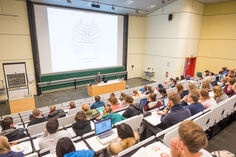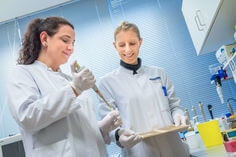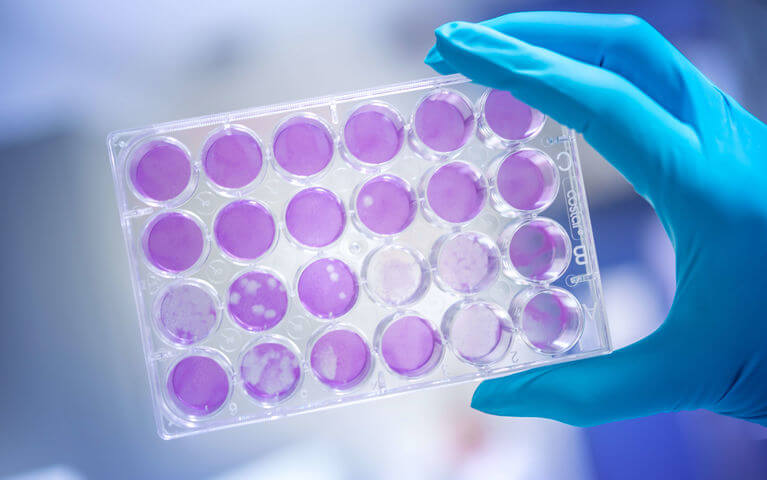Pharmakologisches Institut
Das Pharmakologische Institut der Medizinischen Fakultät Heidelberg fokussiert auf Forschung im Bereich molekulare und systemische Pharmakologie. Darüber hinaus beteiligt sich das Institut aktiv an der Lehre, Weiterbildung und Forschung im Fach Pharmakologie und Toxikologie mit Unterrichtsveranstaltungen für Studierende der Medizin und Pharmazie und ist in die mittelbare Krankenversorgung eingebunden. Das Pharmakologische Institut gliedert sich in vier Bereiche:
- Abteilung Molekulare Pharmakologie (Direktorin: Prof. Dr. Rohini Kuner)
- Abteilung Allgemeine Pharmakologie (Direktor: Prof. Dr. Marc Freichel)
- Sektion Pharmazeutische Pharmakologie (Sektionsleiter: Prof. Dr. Jan Siemens)
- Steroidlabor
Aktuelle Information
New insights into the synaptic basis of chronic pain
A team of scientists has found a novel road-block in the pain pathway, which could be used to treat chronic pain. Their results are published March 13 in the online, open-access journal PLoS Biology.
Pain is an important physiological function that protects our bodies from harm. Pain-sensing nerves transduce harmful stimuli into electrical signals and transmit this information to the brain via the spinal cord. However, when these nerves get activated persistently, such as after injury or inflammation, the information flow into the spinal cord is remarkably amplified. This phenomenon, termed 'synaptic long-term potentiation (LTP)', is an important biological property that is evolutionarily conserved from lower organisms to humans.
To gain a better understanding of how LTP works in the context of pain signaling, the team led by Rohini Kuner (Heidelberg University, Germany) and Ceng Luo (Fourth Military Medical University, China) took advantage of biochemical, genetic, physiological, and behavioral tools available in mice. They studied how LTP works at the synaptic connection between peripheral pain sensors and spinal cord neurons. They found that presynaptic events that unfold in the spinal endings of pain-sensing nerves are required for this pain amplification.
"Our results indicate that an enzyme termed cGMP-activated Kinase 1 (PKG-1) is a key player in this important process", says Ceng Luo. By removing PKG-1 specifically from the presynaptic neurons in this pathway, their group found that not only was LTP abolished, but that pain-related memory and behavior were also altered. Can these basic biological findings be put to use? Chronic pain is a major cause of poor quality of life worldwide; recent demographic studies indicate that one in every six people in Europe suffers from chronic pain.
"Our observation that genetically silencing PKG-1, or blocking its activation, in pain-sensing nerves markedly reduced chronic inflammatory pain paves the way for potential new therapeutic approaches", says Rohini Kuner.
Funding:
This work was supported by a Chica and Heinz Schaller Foundation prize to R.K., grants from National Science Foundation of China (No. 30970971 and No. 31171065) to C.L., grants from Fourth Military Medical University (No. 00002215) to C.L. and grants from the Deutsche Forschungsgemeinschaft (DFG) to R.K. and a European Commission grant LSHM-CT-2005-019055 to T.K. R.K. and T.K. are supported by the CellNetworks Cluster of Excellence (EXC81). M.K. is a recipient of a postdoctoral program fellowship from the Medical Faculty of the University of Heidelberg. The funders had no role in study design, data collection and analysis, decision to publish, or preparation of the manuscript.
Competing interests: The authors have declared that no competing interests exist.
Citation: Luo C, Gangadharan V, Bali KK, Xie R-G, Agarwal N, et al. (2012) Presynaptically localized cyclic GMP-dependent protein Kinase 1 is a key determinant of spinal synaptic potentiation and pain hypersensitivity. PLoS Biol 10(3): e1001283. doi:10.1371/journal.pbio.1001283
Contact: Rohini Kuner
Geschäftsführender Direktor
Prof. Dr. Marc Freichel
Sekretariate
Christl Gartner, christl.gartner(at)pharma.uni-heidelberg.de
Arbeitsgruppe Prof. Dr. Rohini Kuner
Tel.: +49 (0) 6221 / 54 - 16601
Fax: +49 (0) 6221 / 54 - 16620
Bettina Miethe, Admin-AGFreichel(at)pharma.uni-heidelberg.de
Arbeitsgruppe Prof. Dr. Marc Freichel
Tel.: +49 (0) 6221 / 54 - 86866
Fax: +49 (0) 6221 / 54 - 8644
Daria Peshcherova, office-agsiemens(at)pharma.uni-heidelberg.de
Arbeitsgruppe Prof. Dr. Jan Siemens
Tel.: +49 (0) 6221 / 54 - 8288
Fax: +49 (0) 6221 / 54 - 8367
Lisa Gölz, lehrsekretariat(at)pharma.uni-heidelberg.de
Koordination Lehre
Tel.: +49 (0) 6221 / 54 - 8695




